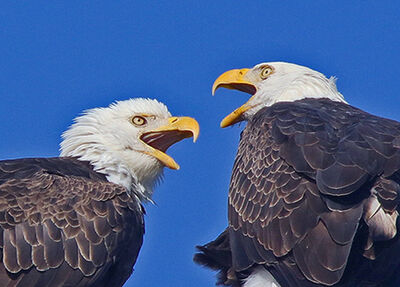Full frame or Mirrorless
Dec 6, 2019 19:43:50 #
I'm Happy with slr's with one exception.
Doing freelance work means not disturbing people every-so-often. Mirrorless is totally quiet.
I rest my case.
Doing freelance work means not disturbing people every-so-often. Mirrorless is totally quiet.
I rest my case.
Dec 6, 2019 19:54:04 #
josquin1
Loc: Massachusetts
I always wondered why the DSLRs had mirrors as digital is electronic. I always thought that they could just eliminate the mirrors once they figured how to reroute the light. It just seems to be the logical step in camera development.
Dec 6, 2019 20:15:53 #
I am a full frame shooter now for 3 years . AllI can tell you for sure is if you go full frame or mirrorless keep the crop sensor , why the answer is this I had a crop sensor nikon D7100 which is 24 megapixels , I thought using my new D810 at 36 megapixels would suffice for all my needs but when the d810 is used in crop mode it is only 15 megapixels so I find myself looking for a D500 just to get some megapixels back and of coarse more reach with long lenses . I love my d810 for landscapes but miss my d7100 for birding . I also would not buy or use a mirrorless because my d810 has all my major functions on top off the camera and not buried in menus as with
Mirrorless, but redesign a d850 with no mirror and leave the buttons and dials where they are ,now I would buy that !!!!!
Mirrorless, but redesign a d850 with no mirror and leave the buttons and dials where they are ,now I would buy that !!!!!
Dec 6, 2019 20:20:57 #
Billshots wrote:
Hi all,
I am trying to decide on a new camera purchase. Currently I have a Canon 60D which I have had many years of enjoyment. I know the value of full frame having shot with film years ago. I just don't know if mirrorless is a necessity. Any help or thoughts would be appreciated.
I am trying to decide on a new camera purchase. Currently I have a Canon 60D which I have had many years of enjoyment. I know the value of full frame having shot with film years ago. I just don't know if mirrorless is a necessity. Any help or thoughts would be appreciated.
If you need fast accurate AF, stay with Canon DSLR for another year or two ....if not, mirror less is the future for you - NOW.
.
Dec 6, 2019 21:11:13 #
Billshots wrote:
Hi all,
I am trying to decide on a new camera purchase. Currently I have a Canon 60D which I have had many years of enjoyment. I know the value of full frame having shot with film years ago. I just don't know if mirrorless is a necessity. Any help or thoughts would be appreciated.
I am trying to decide on a new camera purchase. Currently I have a Canon 60D which I have had many years of enjoyment. I know the value of full frame having shot with film years ago. I just don't know if mirrorless is a necessity. Any help or thoughts would be appreciated.
FF mirrorless or DSLR from Canon the choice could be do you have EFS lenses.
FF DSLR will not be able to use them the mirrorless Canon can use them.
Every lens you own will work perfectly on the mirrorless.
The DSLR FF will only mount EF lenses.
Dec 6, 2019 21:18:58 #
The difference between who you are and the photographer you want to be is really just the mirror.
Dec 6, 2019 22:59:43 #
DaveJ
Loc: NE Missouri
Architect1776 wrote:
FF mirrorless or DSLR from Canon the choice could be do you have EFS lenses.
FF DSLR will not be able to use them the mirrorless Canon can use them.
Every lens you own will work perfectly on the mirrorless.
The DSLR FF will only mount EF lenses.
FF DSLR will not be able to use them the mirrorless Canon can use them.
Every lens you own will work perfectly on the mirrorless.
The DSLR FF will only mount EF lenses.
The EFS will work, but the reduction in megapixels might not be called perfect on the mirrorless. The following was copied from a thread on the dpreview.
" According to Canon, when EF-S lenses are used on the EOS R camera the camera "will automatically produce cropped 11.6-megapixel images that match the smaller image circle of EF-S optics." So a 30mp camera effectively is now 11.6mp, much less than what I have with my current set up"
Dec 7, 2019 03:21:27 #
rmalarz wrote:
Mirrorless is not a necessity. That is if you aren't one to fall for the latest fad or gimmick.
--Bob
--Bob
EVF is not a fad or gimmick it is a technicnological advancement as surely as the wheel was a while ago.
Would you say that the wheel is not a necessity? Of course - we could drag our belongings on two poles
behind a horse, but......

Dec 7, 2019 03:27:59 #
DaveJ wrote:
The EFS will work, but the reduction in megapixels might not be called perfect on the mirrorless. The following was copied from a thread on the dpreview.
" According to Canon, when EF-S lenses are used on the EOS R camera the camera "will automatically produce cropped 11.6-megapixel images that match the smaller image circle of EF-S optics." So a 30mp camera effectively is now 11.6mp, much less than what I have with my current set up"
" According to Canon, when EF-S lenses are used on the EOS R camera the camera "will automatically produce cropped 11.6-megapixel images that match the smaller image circle of EF-S optics." So a 30mp camera effectively is now 11.6mp, much less than what I have with my current set up"
Well yes - but 11.6 mpx is a respectable and sufficient size for most purposes - and you would still have the huge advantages offered by EVF.

Dec 7, 2019 06:54:37 #
Retina
Loc: Near Charleston,SC
GENorkus wrote:
I'm Happy with slr's with one exception.
Doing freelance work means not disturbing people every-so-often. Mirrorless is totally quiet.
I rest my case.
Doing freelance work means not disturbing people every-so-often. Mirrorless is totally quiet.
I rest my case.
Not all photographers seek or accept work that requires silence. I have also witnessed pros who seemed not to care that they disturb an audience. On the other hand, I understand their need to take a job using the limited gear they happen to own at the time. Others simply lack awareness of what is actually taking place at a concert, play, musical, ballet, or speech.
Dec 7, 2019 12:08:10 #
[quote=Photocraig]Mirror less: Smaller lighter than a FF DSLR. OVF to see what the sensor sees. For Canon the new RF lens tech, quieter operation, and no mirror slap vibrations when mounted for long exposures.
Again, "mirrorless" does not necessarily mean "smaller", or "lighter"as any digital camera can be designed without a mirror. It's just that to exclude a mirror was one more factor in designing a smaller, lighter camera.., but not the ONLY factor. In order to eliminate the mirror, the viewing technology also had to improve, which it has. With that in place, a smaller sensor with fewer but larger pixels could be employed, insuring competitive resolution. This is why the Miro 4/3 format has survived. Naturally the smaller sensor enabled smaller lenses, further achieving the goal of a smaller, lighter camera. Also an OVF does NOT see what the sensor sees, it sees what the lens sees. Newer technology (EVF) has now enabled us to see what the sensor actually sees (Live View). There are, and will be, more FF mirrorless cameras showing up in the near future.
Again, "mirrorless" does not necessarily mean "smaller", or "lighter"as any digital camera can be designed without a mirror. It's just that to exclude a mirror was one more factor in designing a smaller, lighter camera.., but not the ONLY factor. In order to eliminate the mirror, the viewing technology also had to improve, which it has. With that in place, a smaller sensor with fewer but larger pixels could be employed, insuring competitive resolution. This is why the Miro 4/3 format has survived. Naturally the smaller sensor enabled smaller lenses, further achieving the goal of a smaller, lighter camera. Also an OVF does NOT see what the sensor sees, it sees what the lens sees. Newer technology (EVF) has now enabled us to see what the sensor actually sees (Live View). There are, and will be, more FF mirrorless cameras showing up in the near future.
Dec 7, 2019 12:37:48 #
xt2
Loc: British Columbia, Canada
Billshots wrote:
Hi all,
I am trying to decide on a new camera purchase. Currently I have a Canon 60D which I have had many years of enjoyment. I know the value of full frame having shot with film years ago. I just don't know if mirrorless is a necessity. Any help or thoughts would be appreciated.
I am trying to decide on a new camera purchase. Currently I have a Canon 60D which I have had many years of enjoyment. I know the value of full frame having shot with film years ago. I just don't know if mirrorless is a necessity. Any help or thoughts would be appreciated.
I use both formats and typically take a mirrorless with me for anything, including a recent wedding shoot, except for something pretty specific. Having said this, it’s been over two years since my “Battleship” SLRs have seen action. This forum focuses on full-frame users, so understand the inherent bias, there are other forums that might provide differing opinions. Try a few different cameras in hand at your fav camera store for your own evaluation...
Merry Christmas!
Dec 7, 2019 13:36:51 #
amfoto1
Loc: San Jose, Calif. USA
Billshots wrote:
Hi all,
I am trying to decide on a new camera purchase. Currently I have a Canon 60D which I have had many years of enjoyment. I know the value of full frame having shot with film years ago. I just don't know if mirrorless is a necessity. Any help or thoughts would be appreciated.
I am trying to decide on a new camera purchase. Currently I have a Canon 60D which I have had many years of enjoyment. I know the value of full frame having shot with film years ago. I just don't know if mirrorless is a necessity. Any help or thoughts would be appreciated.
Full frame versus crop sensor is one topic. Each sensor format has it's advantages and disadvantages. (And experience with film cameras has very little relevance to digital, in spite of frequently being used for reference.)
Mirrorless versus DSLR is largely a separate topic. And, once again, each type of camera has it's advantage and disadvantages.
I'd suggest you first do thorough research about sensor format... Only then, once you've decided which is best for you, research mirrorless versus DSLR.
For example.... full frame cameras may be a better choice for very low light shooting, for making very large prints, and for potentially greater control over depth of field. But, full frame comes with a considerably higher price tag, larger size and more weight (both the cameras and full frame-capable lenses to use upon them), somewhat limited lens selection (full frame cameras basically require full frame capable lenses), and, usually, with slower frame rates. Full frame is ideal for someone who shoots a lot with wide angle lenses, but is somewhat detrimental for a photographer who relies upon powerful telephotos.
Crop sensor cameras "leverage" telephotos but have more limited wide angle potential. Crop cameras and the lenses used upon them tend to be lower cost, smaller and lighter. Croppers can have faster frame rates and often have greater choice of lenses (since crop cameras can use both full frame and crop-only lenses). Current crop cameras are able to produce excellent prints up to and larger than most people ever make and there have been significant improvement in their low light capabilities in recent years.
Mirrorless cameras might be smaller and lighter than DSLRs. Generally speaking, crop sensor DSLRs are larger and heavier than comparable mirrorless. However, there's less size and weight difference between full frame mirrorless and full frame DSLRs. A FF mirrorless camera body may be a bit smaller and noticeably lighter than a FF DSLR body, but the lenses for the FF mirrorless camera can be just as large or even larger than their DSLR counterparts. With fewer lenses available, so far, for mirrorless... often DSLR lenses might be adapted for use on the mirrorless camera. In that case, the adapting largely offsets size and weight savings.
Due to the growing popularity of mirrorless and the waning popularity of DSLRs, the former can be more expensive than comparable models of the latter. This isn't always the case... for example Canon's 30MP EOS-R mirrorless camera is considerably less expensive than their 30MP EOS 5D Mark IV DSLR. The 26MP EOS RP is on sale for $999, while the 26MP 6D Mark II is selling for $1199. However, Canon RF lenses for the R-series cameras tend to be more expensive than comparable EF lenses for the 5DIV and 6DII. The Canon EF 50mm f/1.2L is selling for $1269 right now, while the RF 50mm f/1.2L costs $2100. The RF 70-200mm f/2.8L IS costs $2699, while the EF 70-200mm f/2.8L IS III is selling for $1799. This isn't always the case though.... Canon 24-105mm f/4 lenses in both systems are the same price. The RF 35mm f/1.8 IS Macro lens is currently selling for $100 less than the EF 35mm f/2 IS lens. Note: EF lenses can be adapted for use on R-series mirrorless cameras. But RF lenses cannot be adapted for use on the DSLRs.
Mirrorless cameras use an electronic viewfinder (EVF), while most DSLRs use an optical viewfinder (OVF). This is both a plus and a minus. The EVF can give helpful exposure preview and brighten up low light conditions, but they tend to use a lot more power, resulting in far fewer shots per battery charge than can be gotten with a DSLR. For example, the Canon R and RP are rated for approx. 370 and 250 shots per charge, respectively. In comparison, the 5DIV and 6DII are rated to give 900 and 1200 shots, respectively. While there are things that can be done to improve those numbers in both cases, someone who shoots high volume of images will very likely need to buy and carry more batteries for the mirrorless cameras. (Also, there are battery grips available to double battery capacity for the EOS R, 5DIV and 6DII... but not for the EOS RP.)
Most mirrorless cameras' image sensors are exposed when the lens is removed. It's not safely tucked away behind a mirror and a closed shutter, like a DSLR's sensor. Further, the typical DSLR's hidden sensor is located over 1.75" inside the camera body, while mirrorless' exposed image sensors are typically only recessed about .75", potentially making them more susceptible to dust or accidental damage. Plus, some mirrorless use an "in camera" image stabilization system, which moves the sensor itself to counteract camera movement, and users are recommended not to attempt cleaning those sensors themselves.
There's more, but hopefully you get the idea...
There are advantages and disadvantages to both full frame and crop sensor image formats.
There are also advantages and disadvantages to both DSLRs and mirrorless camera types.
Pick and choose what fits your particular needs best. Speaking only for myself, I continue to use APS-C (crop) DSLRs for sports photography. I use a full frame DSLR for portraits and some macro. I am considering a compact mirrorless for street photography... And, once lens selection gets better, I might consider a full frame mirrorless for landscape photography. But that's just me.
Dec 7, 2019 13:41:04 #
Billshots wrote:
Hi all,
I am trying to decide on a new camera purchase. Currently I have a Canon 60D which I have had many years of enjoyment. I know the value of full frame having shot with film years ago. I just don't know if mirrorless is a necessity. Any help or thoughts would be appreciated.
I am trying to decide on a new camera purchase. Currently I have a Canon 60D which I have had many years of enjoyment. I know the value of full frame having shot with film years ago. I just don't know if mirrorless is a necessity. Any help or thoughts would be appreciated.
Hi Billshots,
You said "I know the value of full frame having shot with film years ago"
A Full Frame is a digital camera with a sensor equivalent in size to a single frame in a 35mm film camera. I guess most of us shot with a 35mm fim camera years ago. Why does having done this help in "knowing the value of full frame" digital cameras?

Dec 7, 2019 21:41:14 #
amfoto1 Wrote:
Mirrorless cameras might be smaller and lighter than DSLRs.
Mirrorless cameras can be any size. "Full Frame or Mirrorless" is not a valid comparison.
Mirrorless cameras might be smaller and lighter than DSLRs.
Mirrorless cameras can be any size. "Full Frame or Mirrorless" is not a valid comparison.
If you want to reply, then register here. Registration is free and your account is created instantly, so you can post right away.





